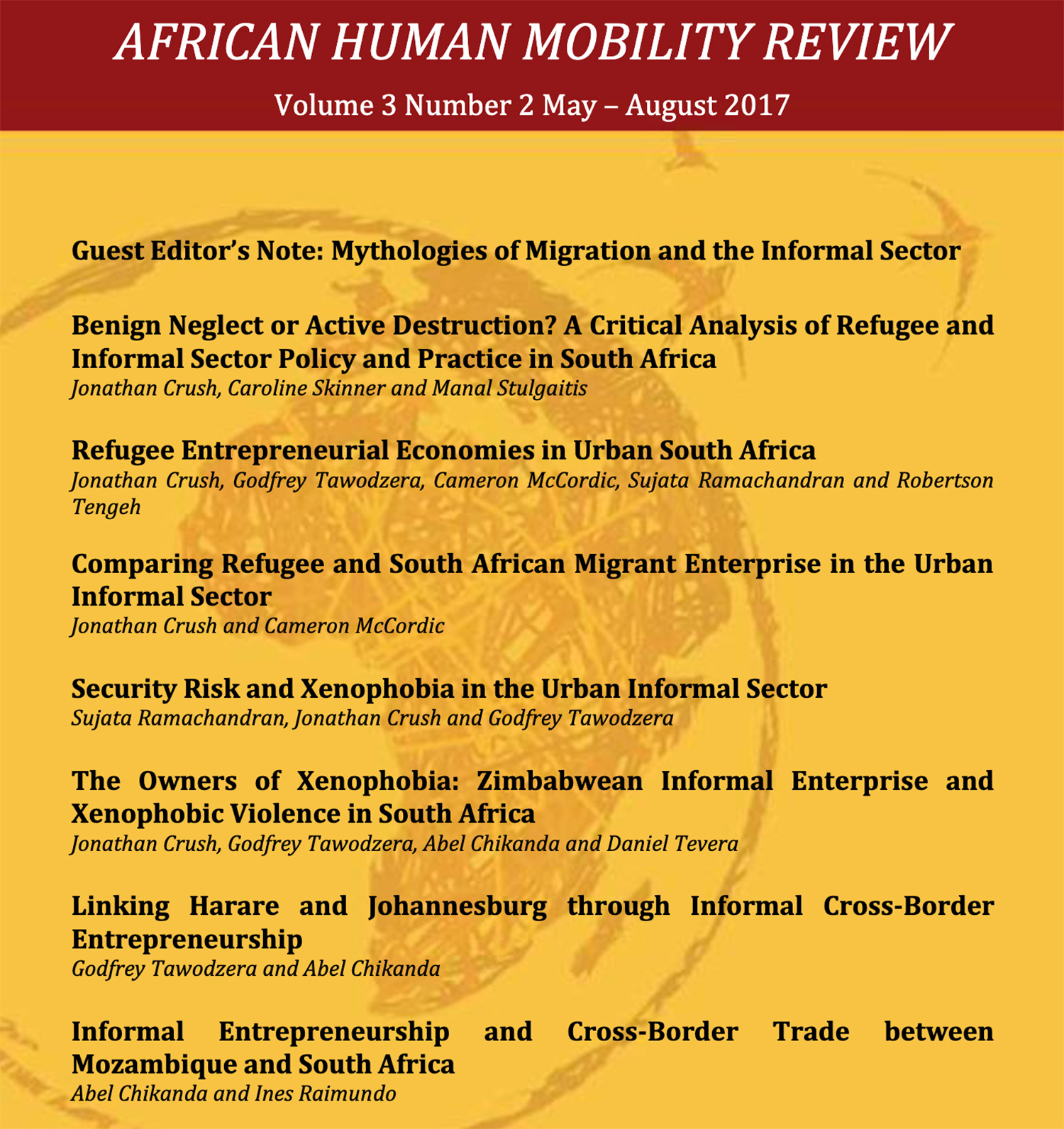SPECIAL ISSUES

Cities of Contagion: Pandemic Precarity, Migration, and Food Security in Urban Africa
Jonathan Crush, Zack Ahmed
African Human Mobility Review 2024, 10(3).
This Special Issue seeks to enhance our understanding of the nexus between migration and food security in urban Africa in at least three ways: first, it examines how COVID-19 impacted migrant populations in African cities by bringing together a selection of the latest research that centers the experiences of migrants before, during, and after the pandemic. Second, given that more and more refugees in Africa are city-based, it looks at how urban refugees pursue a living outside refugee encampments and with what consequences for building food security. And third, it focuses on the links between food security and the participation of migrants in the informal food sector. As a grouping, the papers seek to transcend the simplistic depiction of migrants as passive victims of the pandemic and instead emphasizes their role as active participants in urban food systems, whether as traders, remittance senders, or informal workers. At the same time, the papers draw attention to the structural barriers that continue to limit migrants’ agency.

Food (In)securities and Migrants on the Move
Jonathan Crush, Irudaya Rajan Sebastian
Global Food Security 2024, 41-42.
This special issue presents some of the latest research and policy-related findings on the interface between South-South migration and the food insecurity of forced and voluntary migrants. The issue discusses the state of knowledge on three key themes and shows how the individual contributions address knowledge gaps in the literature. These themes include: the food insecurity of migrants in migration corridors the food security challenges facing migrants in cities of destination; and the disruptions to both food security and migration caused by the COVID-19 pandemic. The introduction will also draw out the practical policy implications of the contributions.

Impacts of COVID-19 on Urban Food Security
Jonathan Crush, Elizabeth Opiyo Onyango, Jeremy Wagner
Land 2022, 11(6).
COVID-19 and its associated health policies have dramatically affected food systems and food security in cities around the world. The pandemic has led to increases in levels of vulnerability and has created complexities within urban food systems by worsening household income and chronic and acute hunger, and disrupting food supply chains, which were widespread issues even prior to the pandemic. COVID-19 has exacerbated these issues by affecting vulnerable households in almost every city, and more specifically, the overcrowded cities of the Global South. As the threat of new variants looms, these impacts are expected to persist for the foreseeable future. Our changing food systems, livelihood strategies, and food security experiences remain areas of concern that require more research.
In this Special Issue, we bring together papers that reveal the complexities and impacts of the COVID-19 pandemic and its associated health policies on urban food security in the Global South. We are seeking empirical research or conceptual/theoretical works which examine key processes and issues including, but not limited to:
- Disruptions to income and livelihood vulnerability in cities;
- Food supply chain disruptions;
- Urban household food access, availability, utilization and stability;
- Social relations of inequality and/or difference such as gender, age, race, class and ethnicity;
- Urban food system governance and resilience;
- Rural-to-urban, urban-to-urban, transboundary, and multiscalar linkages.

African Human Mobility Review
Jonathan Crush et al.
African Human Mobility Review 2017, 3(2): 751-943.


Cultivating the Migration-Food Security Nexus
Jonathan Crush, Mary Caesar (eds.)
International Migration 2017, 55(4): 10-102.
In this issue of International Migration we have a special section, Cultivating the Migration-Food Security Nexus, which has been Guest-Edited by Jonathan Crush and Mary Caesar. As scholars examine ever more closely the relationship between migration and development, that of the relationship between migration and food security is fast becoming a natural relative. The second of the United Nations Sustainable Development Goals is to “End hunger, achieve food security and improved nutrition, and promote sustainable agriculture”. Interestingly, none of its targets and indicators refers to migration. We are happy to address this lacuna in this special section.

Africa’s Urban Food Deserts
Jane Battersby and Jonathan Crush
Urban Forum 2014, 25(2): 143-151.
Since the mid-1990s, the concept of the ‘urban food desert’ has been extensively applied to deprived neighbourhoods in European and North American cities. Food deserts are usually characterised as economically-disadvantaged areas where there is relatively poor access to healthy and affordable food because of the absence of modern retail outlets (such as supermarkets). This idea has not been applied in any systematic way to cities of the Global South and African cities in particular. Yet African cities contain many poor neighbourhoods whose residents are far more food insecure and malnourished than their counterparts in the North. This paper reviews some of the challenges and difficulties of conceiving of highly food insecure areas of African cities as conventional food deserts. At the same time, it argues that the concept, appropriately reformulated to fit African realities of rapid urbanisation and multiple food procurement systems, is a useful analytical tool for African urban researchers and policy-makers. Although supermarkets are becoming an important element of the food environment in African cities, a simple focus on modern retail does not adequately capture complexity of the African food desert. In the African context, the food deserts concept requires a much more sophisticated understanding of over-lapping market and non-market food sources, of the nature and dynamism of the informal food economy, of the inter-household differences that lead to different experiences of food insecurity and of the Africa-specific conditions that lead to compromised diets, undernutrition and social exclusion. The papers in this special issue explore these different aspects of African food deserts defined as poor, often informal, urban neighbourhoods characterised by high food insecurity and low dietary diversity, with multiple market and non-market food sources but variable household access to food.
